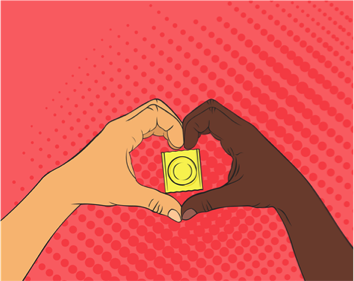
What is Prostatitis?
Prostatitis describes irritation to the prostate gland. It is thought to affect 35-50% of men at some point during their lifetime. The prostate is a small gland that sits just underneath a man’s bladder. It produces the fluid to carry sperm out during ejaculation (cumming). The irritation can be caused by a number of things but usually it is triggered by infection or trauma (damage).
Prostatitis can be divided into:
- Acute (sudden)
- Chronic (long term)
This information page concentrates on the chronic form.
More information on the different forms of prostatitis can be found here.

What is Chronic Pelvic Pain in Men?
Chronic pelvic pain in men and chronic prostatitis are terms often used to describe the same thing. The full agreed title for both conditions is the chronic pelvic pain syndrome (CPPS). CPPS can affect both men and women. This page concentrates on the condition in men.
CPPS in men causes repeat feelings of genital pain over a period of months or years. Importantly these symptoms need to be there in the absence of infection.

What are the symptoms?
The main symptom is genital pain which is chronic (long lasting) and variable (comes and goes). CPPS is usually identified when someone has had the pain for 3 or more of the last 6 months. The pain can affect different parts of the genitals including your:
- Penis, often at the tip
- Testicles (balls)
- Perineum (area between the testicles and your bottom)
- Lower abdomen (tummy)
Sometimes the pain can be made worse when passing urine (peeing) and on ejaculation (cumming). Passing urine can also sometimes feel slower than normal. CPPS can also be caused by, or can cause itself, problems with anxiety and depression. This can lead to problems with your sexual function such as struggling to get an erection (erectile dysfunction) or cumming too quickly (premature ejaculation).

What causes CPPS?
So far there has not been a single clear cause of CPPS. It is a poorly understood condition that we are learning about all the time. There are number of things that are thought to play a part in developing the condition:
- Infection – STIs or other infections such as urine infections (UTIs)
- Muscle spasm in the pelvic floor – tightening of the muscles that support the bottom of your abdomen (tummy)
- This tightening can slow down the passage of your urine from your bladder, causing it to back up and flow into the prostate
- The brain and/or prostate becoming “over-sensitive” to pain in the local area
- Irritation of the prostate by an unknown cause
- Psychological – anxiety or depression

How can you test for it?
A number of tests can be taken in our clinics. These are:
- A urine test to look for STIs
- A urine test to look for a urine infection
- Blood tests to check for other infections (HIV, syphilis)
- Blood tests to check for prostate cancer (PSA)
- A swab from the penis to look for irritation
A prostate examination is also usually performed to see if the gland is painful. This is performed by feeling the prostate by placing a finger into your rectum (back passage) which is right next to the gland.
Some more detailed tests, including scans of the prostate and assessments of your urine flow, can be arranged via referral to a specialist (urologist) at a local hospital.

How is it managed?
In our clinics we can manage prostatitis / CPPS caused by infections. These infections are treated with courses of antibiotics. We also give lifestyle advice to try to reduce or prevent symptoms from occurring in future.
You can also help yourself. Our main suggestion would be to start by reading about the condition. A good start is this online patient information.
You can also read about helpful pelvic floor exercises here.
Painful episodes often respond to simple painkillers such as paracetamol or ibuprofen. A hot bath can also help to relax the pelvic muscles and relieve your symptoms.
Some treatments are available from your GP. This can include medical treatments:
- Alpha blockers – medications that help to relax the pelvic floor muscles and prostate
- Nerve painkillers – especially with symptoms that started recently these medications can be helpful
More complex management is usually led by your specialist (urologist). This can include combinations of treatments including medication, psychological therapy and physiotherapy.
You will see by the number of treatments on offer that managing CPPS is not straight forward. The key to success is if you and your doctor have a good relationship, working towards a goal of reducing or stopping your symptoms.

What should I do if I think I have Prostatitis / Chronic Pelvic Pain in Men?
If you would like to talk to someone about investigating and managing your symptoms we would suggest starting with your GP. Your GP has access to tests, treatments and specialists who can help you.
If we pick up these symptoms in our clinics we can help too, but we don’t have all the tools to test and treat CPPS.


